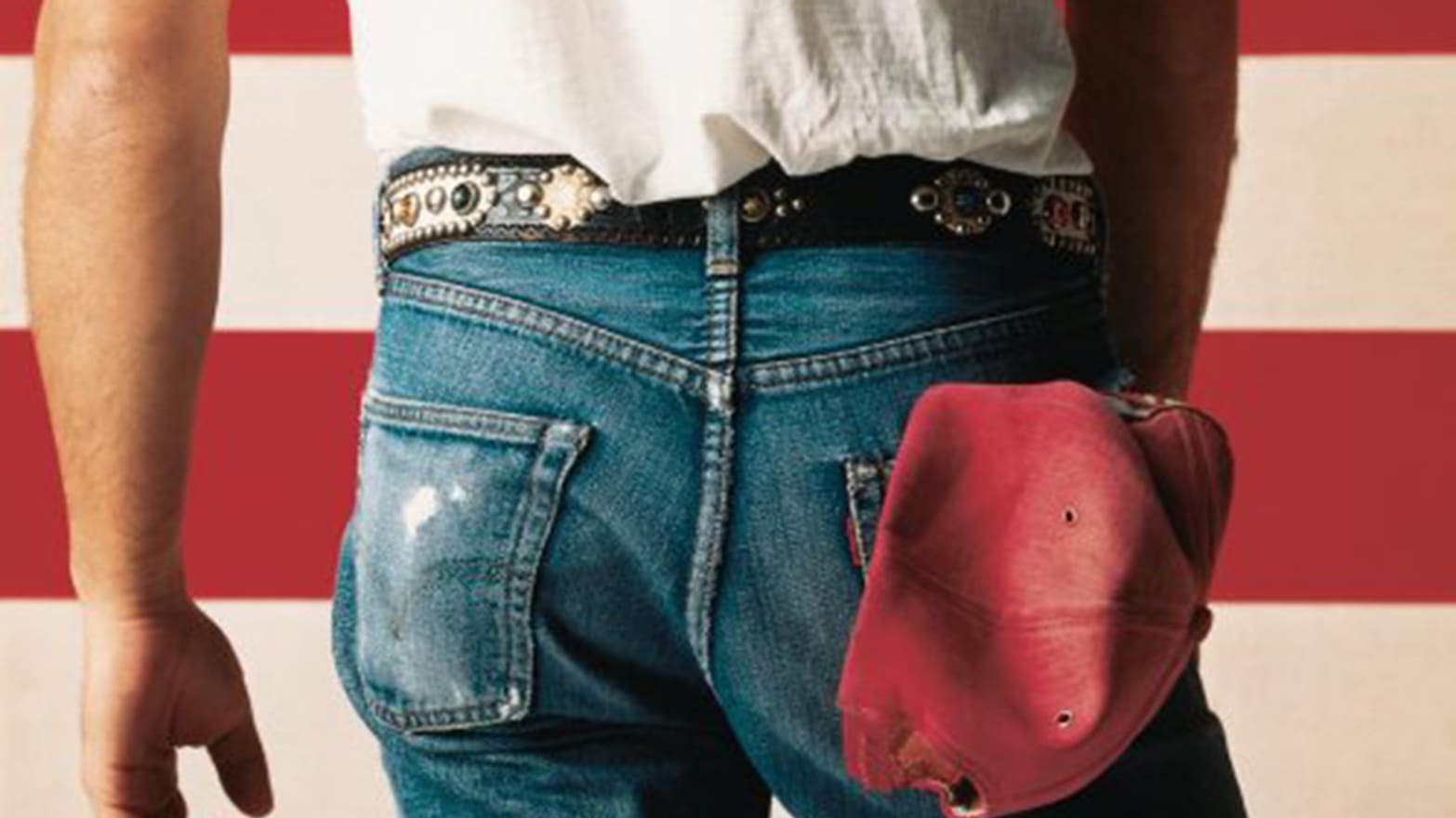On Tuesday night—widely considered a sweeping victory for Republican political candidates—I sat in my apartment, huddled around my TV, watching as election results rolled in. From my couch, as the local NBC affiliate called the Illinois gubernatorial race for GOP candidate Bruce Rauner, I noticed something. As the local news team cut to Rauner campaign headquarters, I heard something in the background: the familiar drum beat and synth lead of one of 1984's most popular tunes, "Born in the U.S.A."
In 1984, Bruce Springsteen released Born in the U.S.A. The album became an immediate success, and it eventually became one of the most successful recordings of all time, selling more than 10 million copies. This success of both the album and its eponymous single is frequently attributed to a belief that the song is a pro-American anthem. In reality, it's anything but.
Despite what many have inferred from the title of both the album and its titular track, it is not a celebration of American Exceptionalism, but rather, an indictment of the government, the military-industrial-complex, and the way in which we treat those who have risked their lives in battle.
As a result of this misunderstanding, the song has become the de facto feel-good election season anthem for politicians nationwide.
"Born down in a dead man's town," the song begins. "The first kick I took was when I hit the ground. You end up like a dog that's been beat too much; [until] you spend half your life just covering up," Springsteen growls in the first verse.
"Born in the U.S.A. I was born in the U.S.A.," he continues into the chorus.
From there, Springsteen continues his narrative of a man sent to fight a war he didn't believe in—Vietnam—and about the conflict involved with being sent "off to a foreign land to go and kill the yellow man." That line, focused on "the yellow man," is almost certainly meant as a reference to the oft-nebulous enemy U.S. soldiers were being sent off to fight, and the typically racist nature of the conflict, itself.
The character, broke and desperate after being turned away from hiring managers at the local refinery, reaches to his local V.A. branch, only to be turned away yet again.
Later, the song paints a portrait of the protagonist's post-war, post-job future, similar to that faced by so many other veterans of the Vietnam war, finding himself "Down in the shadow of penitentiary, out by the gas fires of the refinery" a decade after returning from service
"Nowhere to run ain't got nowhere to go," Springsteen sings before launching into the "Born in the U.S.A." chorus in repetition.
The song—quite obviously the tale of a broken system and of a government that sees its citizens as disposable cogs in a war machine—is by no means is a pro-America anthem.
In the wake of the album's release, Conservative columnists Bernie Goldberg and George Will began touting the New Jersey singer-songwriter as savior to the Republican Party.
"[Springsteen's] shows are like old-time revivals with the same old-time message," Goldberg said during a September 1984 episode of CBS Evening News. "If they work hard enough and long enough, like Springsteen himself, they can also make it to the promised land."
While the messaging described by Goldberg—of a meritocracy in which anyone can make it if they just work hard enough—has long been a mainstream Conservative belief, it most certainly was not one apparent in Springsteen's lyrics.
Will took things a step further, even suggesting that President Reagan formally request Springsteen's endorsement.
While campaigning for reelection in 1984, President Ronald Reagan included the following in his stump speech: "America's future rests in a thousand dreams inside your hearts. It rests in the message of hope in songs so many young Americans admire: New Jersey's own Bruce Springsteen. And helping you make those dreams come true is what this job of mine is all about."
Whether Reagan was aware of Springsteen's own famously working-class Liberal politics or not, he began a trend now entering its 30th year: the misunderstanding of The Boss.
At the time, Springsteen's album sat at number two on the Billboard charts. Not particularly interested in turning down a compliment from a sitting president, Springsteen tried to shrug off the statement while maintaining that President Reagan had likely mistaken his own messaging, saying at that Friday's show, "Well, the president was mentioning my name in his speech the other day, and I kind of got to wondering what his favorite album of mine must’ve been, you know? I don’t think it was the [explicitly Liberal] Nebraska album, [and] I don’t think he’s been listening to [Born in the U.S.A.].”
In all, the comment seemed to be a bit of gentle ribbing with the leader of the free world. After all, it was entirely possible that the president had been simply misinformed about Springsteen's lyrics.
From gentle ribbing to exasperation, Springsteen employed famed filmmaker John Sayles to craft a video so obvious, so clear, that President Reagan and others would find it near impossible to misinterpret.
The Sayles-directed video centered around live concert footage intercut with shots from predominantly Vietnamese segments of Los Angeles, the video highlights blue-collar workers, soldiers-in-training, and most heartbreakingly, shots of returning veterans in line for payday loans.
"It was right around the time that Ronald Reagan had co-opted 'Born In The U.S.A.' and Reagan, his policies were everything that the song was complaining about," said Sayles in I Want My MTV. "I think some of the energy of the performance came from Bruce deciding, 'I'm going to claim this song back from Reagan.'"
"This was when the Republicans first mastered the art of co-opting anything and everything that seemed fundamentally American, and if you were on the other side, you were somehow unpatriotic," said Springsteen in a 2005 NPR interview. "I make American music, and I write about the place I live and who I am in my lifetime. Those are the things I'm going to struggle for and fight for."
Still, years passed and politicians of all stripes continued to make use of "Born in the U.S.A." during campaign events, rallies, and victory speeches. In one, final, exhausted attempt to clarify the song's true meaning, Springsteen began performing the song to crowds with only the accompaniment of his acoustic guitar. Maybe, just maybe he'd be able to get the message across if he stripped it down to its bare bones.
In no way is this situation unique to Springsteen. During the 2012 election, Mitt Romney drew the ire of indie rockers Silversun Pickups for using their track "Panic Switch," and rapper K'naan for his song "Waving Flag." In 2008, the McCain-Palin ticket received cease and desist notices from Jon Bon Jovi, John Mellencamp, Foo Fighters, Heart, and Van Halen, among others after unauthorized use of these artists' songs during public appearances.
In August 2012, Paul Ryan once claimed his favorite band was Rage Against the Machine, leading guitarist Tom Morello to pen an epic op-ed for Rolling Stone, tearing down the vice presidential candidate.
"Paul Ryan's love of Rage Against the Machine is amusing, because he is the embodiment of the machine that our music has been raging against for two decades," writes Morello. "Charles Manson loved The Beatles but didn't understand them. Governor Chris Christie loves Bruce Springsteen but doesn't understand him. And Paul Ryan is clueless about his favorite band, Rage Against the Machine."
Morello continues taking Ryan to task, writing, "Ryan claims that he likes Rage's sound, but not the lyrics. Well, I don't care for Paul Ryan's sound or his lyrics. He can like whatever bands he wants, but his guiding vision of shifting revenue more radically to the one percent is antithetical to the message of Rage."
Much as Springsteen wondered which of his albums made the president's playlist, Morello asks, "I wonder what Ryan's favorite Rage song is? Is it the one where we condemn the genocide of Native Americans? The one lambasting American imperialism? Our cover of 'Fuck the Police'? Or is it the one where we call on the people to seize the means of production?"
Admittedly, Rage Against the Machine is not the type of pop-anthem rock generally comparable to Springsteen (Ryan was not trotting out "Bulls on Parade" or "Guerilla Radio" at campaign stops, but simply rocking out to the band during his famous P90X workouts), and so it's not really possible to compare Morello's (seemingly successful) attempt to publicly shame the Wisconsin politician with The Boss' attempt to educate, update, and elaborate on his own personal political leanings.
Politicians of both major political parties have employed "Born in the U.S.A." in recent years. Much as Rauner headquarters blasted the tune while sitting Senator Mark Kirk made his way to the stage in anticipation of the soon to be governor-elect's speech, in 2008, then-Senator Barack Obama accepted the Democratic nomination for president moments after the song blared across the public address system at Denver's Invesco Field.
Now, obviously, then-candidate Obama's campaign was built on the premise of putting an end to the raging Iraq war, so it's entirely possible that "Born in the U.S.A." was a more appropriate song choice than it was for Reagan or Rauner. Even so, all these years later, perhaps it's time to find a new tune for candidates to trot out to. As the country finds itself becoming increasingly involved in a new military campaign in the Middle East, along with the fact that soldiers returning from combat are still prone to the same type of mistreatment Springsteen sung about all those years ago, this song simply doesn't embody the reality of American politics—at least in a positive way.
So, more than three decades of misunderstanding and willful ignorance later, after spending countless hours into educating the public about the song's true meaning—ironically, the song's working title was "Vietnam," which would have likely been explicit enough to sidestep the headache and fanfare—is it time for The Boss to simply let it go? At what point does his original intent no longer matter, and at what point does it stop feeling hypocritical when politicians who stand for everything an artist opposes come marching on stage to a song antithetical to their own beliefs?

